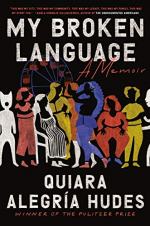|
This section contains 471 words (approx. 2 pages at 400 words per page) |

|
My Broken Language: A Memoir Summary & Study Guide Description
My Broken Language: A Memoir Summary & Study Guide includes comprehensive information and analysis to help you understand the book. This study guide contains the following sections:
This detailed literature summary also contains Topics for Discussion on My Broken Language: A Memoir by Quiara Alegría Hudes.
The following version of this book was used to create this study guide: Hudes, Quiara Alegrìa. My Broken Language. New York: One World, 2021.
In this memoir, playwright Quiara Alegrìa Hudes writes about her childhood and youth, as well as about the lives of her family members. Her mother, Virginia Perez, was born in Puerto Rico. On several occasions during Virginia’s childhood, Virginia seemed to have psychic visions. As a result, she maintained a close connection to Christianity and Puerto Rican spiritual practices throughout her life. In the 1950s, Virginia and her mother—Obdulia—moved to New York City and settled in the Bronx. There, they witnessed many egregious instances of systemic racial oppression against non-white Americans. They eventually relocated to Philadelphia.
In adulthood, Virginia worked as a carpenter for years before eventually shifting to a career in activism on behalf of the female Hispanic population of Philadelphia. She entered a relationship with Henry Hudes, a Caucasian man of Jewish descent. They never married, but they conceived and gave birth to Quiara. At first, Quiara was raised by both of her parents. The three of them moved to a predominantly white suburb of Philadelphia, but Quiara and Virginia felt like outsiders there. While Virginia was very religious, Henry was an ardent atheist. Virginia and Henry had a volatile relationship, and they broke up after Henry committed multiple marital infidelities.
Virginia moved back to West Philadelphia with Quiara and was her primary caretaker. Virginia’s mother and siblings also occasionally helped take care of Quiara. Quiara idolized her cousins, but as they grew older, some of those cousins faced pronounced hardships. Quiara’s cousins Flor and Nuchi each had children at a young age. Also, Flor struggled with drug addiction. Quiara worked hard in school and was fortunately granted admission to a ‘magnet’ school with more resources than the public school she previously attended. She then received acceptance to Yale University, where she majored in music and also studied literature. She was disappointed by the degree to which the music curricula were mostly dedicated to studying the works of white male European composers.
After college, Quiara pursued a career in music, and although she gained some traction in the industry, she ultimately felt more interested in pursuing a writing career. She gained acceptance to the highly selective MFA playwriting program at Brown University. There, her main mentor was Pulitzer Prize-winning playwright Paula Vogel, who enthusiastically supported Quiara’s artistic goals. Quiara writing was mostly inspired by the personal stories and experiences of family members on her mother’s side of the family, as Quiara felt that such stories were vastly underrepresented in American media, art, and culture. For her final thesis project, she wrote and staged a full-length play based on the experiences of her younger half-sister Gabi.
Read more from the Study Guide
|
This section contains 471 words (approx. 2 pages at 400 words per page) |

|



